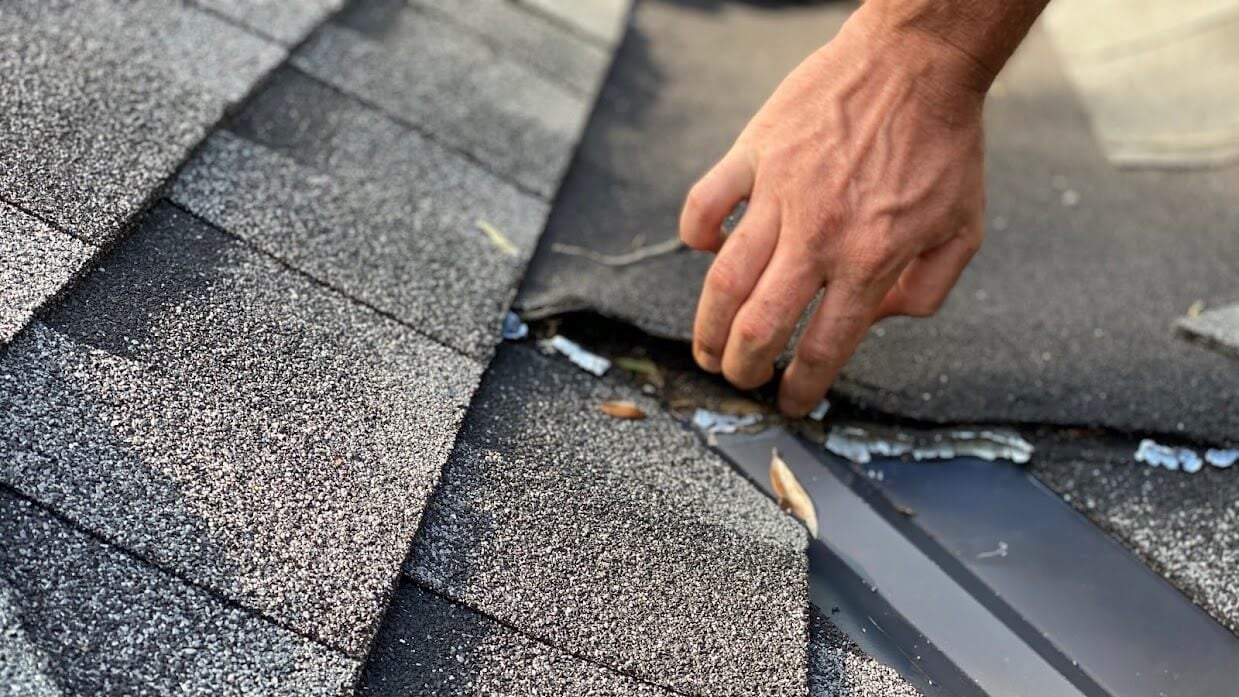Do roofing contractors need to be licensed in Texas? The quick answer is no—there is no state-mandated licensing requirement. However, the Roofing Contractors Association of Texas offers a voluntary program that can help boost a contractor’s credibility. This article explains what you need to know about roofing contractor licensing in Texas.
Key Takeaways
- Roofing contractors in Texas aren’t required to be licensed, but obtaining a voluntary license from RCAT enhances credibility and builds consumer trust.
- The RCAT voluntary licensing program differentiates professional contractors, offering benefits like increased business opportunities and consumer protection.
- Continuing education is essential for maintaining a roofing license in Texas, ensuring contractors stay updated with industry standards and best practices.
Roofing Contractor Licensing in Texas
In Texas, roofing contractors are not required to hold a specific license to operate legally. This lack of mandatory licensing can be both a blessing and a curse. On one hand, it opens up the roofing industry to more entrepreneurial opportunities and lowers barriers to entry. On the other hand, it can make it difficult for consumers to distinguish between qualified Texas roofers and unqualified contractors.

The Roofing Contractors Association of Texas (RCAT) steps in to bridge this gap by offering a voluntary licensing program. While not mandated by Texas law, obtaining an RCAT license can significantly boost a contractor’s credibility and trustworthiness in the eyes of clients. The RCAT manages the standards and requirements for those who choose to pursue this path, ensuring that licensed contractors meet specific industry standards and adhere to best practices.
Voluntary Licensing for Roofing Contractors in Texas
The Roofing Contractors Association of Texas (RCAT) offers a voluntary licensing program designed to elevate the standards of roofing services in the state. Opting for a voluntary license signals a roofing contractor’s commitment to professionalism, quality, and consumer protection. This program ensures that those who obtain the license meet certain standards, demonstrating their dedication to best practices and ethical business conduct.
Voluntary licensing serves as a differentiator in a largely unregulated market. It helps contractors stand out by showcasing their adherence to industry standards and commitment to client satisfaction.
Homeowners who hire a voluntarily licensed roofer can expect someone who takes their trade seriously and strives for the highest quality roofing services.
Benefits of Voluntary Licensing
One of the most significant benefits of obtaining a voluntary license is the ability to set oneself apart as a professional service provider. This distinction enhances consumer protection and helps secure public confidence in the roofing industry. Licensed contractors who adhere to industry standards and best practices gain a competitive edge and build trust with potential clients.
Moreover, having a voluntary license indicates a contractor’s commitment to quality and professionalism, which can lead to increased business opportunities and higher earning potential. These advantages contribute to an overall sense of reliability and trustworthiness in the market, benefiting contractors and consumers.
How to Apply for Voluntary Licensing
Obtaining a voluntary roofing license through RCAT involves several steps, including the roofing license process. First, contractors must submit a notarized application form, along with the required fees and evidence of their qualifications. The application process also includes meeting specific requirements set by RCAT based on the type of license being sought.
Once the initial application is approved, contractors must pass a licensing exam and provide proof of financial responsibility, such as insurance or a surety bond. Successfully completing these steps allows contractors to obtain a voluntary license, reflecting their dedication to high standards and quality workmanship.
Types of Roofing Licenses Available
Roofing licenses in Texas are generally categorized into two main types: residential and commercial. Each type of license validates the contractor’s expertise and commitment to quality within specific areas of the roofing industry.
For residential contractors, obtaining a residential roofing license signifies their ability to handle roofing projects on homes, ensuring adherence to safety and performance standards. The fee for this license is $450 for RCAT members or $750 for non-members.

A commercial roofing license is essential for contractors who focus on commercial projects. This license demonstrates a contractor’s capability to manage more significant, more complex roofing projects in commercial settings. A commercial roofing license fee is $450 for RCAT members and $750 for non-members.
Obtaining the appropriate license enhances a contractor’s credibility and attracts more business opportunities.
Exam Requirements for Texas Roofing License
To obtain a roofing license in Texas, contractors must pass a series of exams that assess their knowledge and skills. These exams include a basic business and safety knowledge exam and specific roofing exams tailored to residential or commercial roofing. The exams consist of 50 multiple-choice or true/false questions and cover essential topics required for competent roofing practice.
The exams are conducted online through a secure portal, giving applicants the flexibility to take them at their convenience. Contractors have 90 days to complete the exams, during which they can retake them up to three times if necessary. Each exam requires a score of 70% or higher to qualify for licensing.
Contractors are recommended to purchase the NCRA Roofing Manual set for comprehensive study materials and instructions to prepare for the exams. By passing these exams, contractors demonstrate their proficiency and commitment to industry standards, paving the way for a successful career in roofing.
Insurance Requirements for Roofing Contractors
Insurance is a critical component of the licensing process for roofing contractors in Texas. To qualify for a license, contractors must demonstrate the roofing company’s financial responsibility, typically through general liability insurance or a $100,000 surety bond. This requirement helps protect both the contractor and the client from potential financial losses due to accidents or damages during roofing projects.
General liability insurance covers third-party claims related to property damage or personal injury, providing a safety net for contractors and their clients. Additionally, inland marine insurance protects roofing tools and materials during transportation and at job sites, securing them against theft or damage.
Builder’s risk insurance is also essential for covering properties under construction from potential damages due to various risks, such as theft and natural disasters. Appropriate insurance coverage demonstrates a roofing contractor’s commitment to professionalism and financial responsibility, enhancing credibility and trustworthiness.
Verifying a Roofing Contractor’s License
Verifying a roofing contractor’s license is crucial for homeowners to ensure they hire a qualified and trustworthy professional. One reliable method is to directly ask the contractor for their RCAT license and request a copy for verification. Homeowners can also contact the Roofing Contractors Association of Texas (RCAT) to confirm the contractor’s licensing status.
Another effective way to verify a contractor’s license is to visit the Texas Department of Licensing and Regulation (TDLR) website. Homeowners can enter the contractor’s name or license number into the TDLR’s online search tool to access detailed information about the contractor’s license status, including whether it is active or expired.
This verification process provides peace of mind, ensuring that the contractor meets the necessary standards and qualifications.
Impact of Licensing on Roofing Business Success
A roofing license can significantly impact a contractor’s success in the roofing business. Licensed contractors often experience enhanced consumer trust and increased business opportunities, as clients are more likely to hire professionals who demonstrate a commitment to industry standards and best practices. The RCAT program aims to enhance consumer protection and public trust in the roofing industry.
Having a roofing contractor license also legitimizes the business, increasing its earning potential and attracting more contract opportunities. Homeowners can identify well-qualified and reputable contractors by looking for a roofing license, ensuring they receive quality workmanship and reliable service. Licensed contractors must adhere to strict education and insurance requirements, further boosting client trust and satisfaction.
In a largely unregulated market, obtaining the RCAT License allows roofing contractors to distinguish themselves from thousands of other roofers, showcasing their professionalism and dedication to quality. This distinction can lead to greater success and growth in the roofing industry.
Cost and Renewal of Texas Roofing License
The cost of obtaining and renewing a roofing license in Texas varies depending on the type of license and the contractor’s membership status with RCAT. For first-time applicants, the costs range from $1,045 to $1,945, depending on whether they are RCAT members or non-members. The fees cover application processing, examinations, and licensing for both residential and commercial roofing licenses.
Renewing a roofing license costs $250 annually for members and non-members. Contractors must complete a renewal form and submit the required fee, along with proof of completing eight continuing education units (CEUs) from authorized workshops within the license’s active period. If a license expires, a $200 penalty fee applies if continuing education requirements are not met for timely renewal.
To avoid penalties and ensure their license remains active, contractors should begin the renewal process immediately upon expiration. Continuing education is essential for maintaining a voluntary roofing license in Texas, demonstrating the contractor’s commitment to staying updated with industry standards and practices.
Continuing Education for Licensed Roofers

Continuing education is necessary for maintaining a roofing license in Texas. To renew their license, contractors must provide proof of completing eight continuing education units (CEUs) from recognized workshops or seminars within the active 12-month period. These educational units help contractors stay updated with the latest industry standards, techniques, and best practices, ensuring they continue to provide high-quality roofing services.
If the continuing education requirements are not met, a penalty fee of $200 will be charged, and an additional 30-day grace period will be granted to fulfill the requirements. However, if the requirements are still unmet after the grace period, the license will be terminated, and the contractor must restart the licensing process from the beginning, including all fees.
This emphasizes the importance of continuing education in maintaining a valid and active roofing license.
Does a Texas Roofing License Apply in Other States?
A Texas roofing license does not apply in other states. Each state has its own licensing requirements and regulations for roofing contractors, which can vary significantly from one state to another. Therefore, before operating in a different state, contractors must verify the local licensing requirements and ensure they comply with the specific regulations.
By doing so, contractors can avoid legal issues and ensure they are qualified to provide roofing services in the new location. This verification process helps maintain the integrity and professionalism of the roofing industry across different states.
How Rhino Roofing Approaches Licensing
At Rhino Roofing, we take licensing and quality service seriously. Our commitment to obtaining and maintaining the necessary licenses reflects our dedication to safety standards and industry regulations. Prioritizing licensing ensures that our clients receive the highest quality roofing services, backed by professionalism and trust.
We believe in transforming the perception of roofing services by ensuring client satisfaction and maintaining open communication throughout the roofing project. Our proactive approach to customer relations and adherence to licensing requirements set us apart in the roofing industry.
You can learn more about our services and our commitment to quality by visiting our website.
Summary
In summary, while Texas does not require mandatory licensing for roofing contractors, obtaining a voluntary license through RCAT offers numerous benefits. It enhances consumer trust, demonstrates professionalism, and can significantly impact a contractor’s success in the roofing industry.
For homeowners, verifying a contractor’s license ensures they hire a qualified and trustworthy professional. At Rhino Roofing, we emphasize the importance of licensing and quality service, ensuring our clients receive the best roofing solutions. By staying informed and adhering to industry standards, both contractors and clients can benefit from a regulated and trustworthy roofing market.
Frequently Asked Questions
Is a roofing license required to operate as a roofing contractor in Texas?
You can confidently operate as a roofing contractor in Texas without needing a specific license. This freedom allows you to start and grow your business more easily!
What are the benefits of obtaining a voluntary roofing license in Texas?
Obtaining a voluntary roofing license in Texas boosts consumer trust and showcases your professionalism, opening up more business opportunities. It’s a smart step toward elevating your roofing career!
How can homeowners verify a roofing contractor’s license in Texas?
To ensure you’re hiring a qualified roofing contractor in Texas, you can easily verify their license by visiting the Texas Department of Licensing and Regulation (TDLR) website or by reaching out to the Roofing Contractors Association of Texas (RCAT). Take this step to protect your investment!
What are the costs associated with obtaining and renewing a roofing license in Texas?
For first-time applicants, obtaining a roofing license in Texas can cost between $1,045 and $1,945. Renewing it will cost $250 annually, plus additional fees for continuing education. Staying proactive about these costs will empower you to maintain your license and thrive in the roofing industry!
Does a Texas roofing license apply in other states?
A Texas roofing license does not extend to other states, so you must check and meet local licensing requirements wherever you plan to work. Stay informed and take charge of your opportunities!





